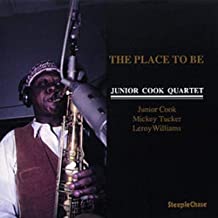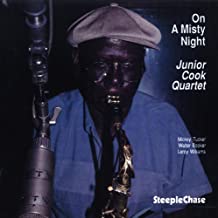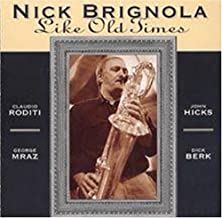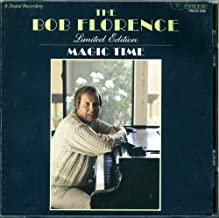-
Posts
13,205 -
Joined
-
Last visited
-
Donations
0.00 USD
Content Type
Profiles
Forums
Events
Blogs
Everything posted by Larry Kart
-

Chet Baker at a peak, and (down below) Junior Cook likewise
Larry Kart replied to Larry Kart's topic in Recommendations
Two gems: I assume the choice of pieces on the above albums was mutual, but it was perfect. The three Mickey Tucker originals are something else. -
-
The man who composed "London Derriere."
-
Listened again to all of "Go West, Young Man" and would rate it a good deal higher than pleasant. For one thing the three rhythm sections include Carl Perkins, Lou Levy, Red Mitchell, LeRoy Vinnegar, Shelly Manne and Mel Lewis, and all three are top notch -- more Perkins is always a joy. All the saxophonists are in fine form --especially Carter (very intense), Perkins, and and Colette (what a lovely player he was). Giuffre's "Bright Moon" is a nutty piece that's hard to get out of your head, and Mariano's sax soli passage on "The Oom is Blues" is something else. Only drawback on the Lonehill CD reissue that also includes the tracks from Jones' terrific "This Is How I Feel About Jazz" album (it's used for the title here) is that the transfer isn't quite what it should be; there are some moments of distortion. Nothing awful, but some people can't stand that, especially if they know that it's the fault of an outfit like Lonehill, while the original LP was perfectly OK.
-
I was making no accusation -- merely pointing out that QJ's name should not lead one to think that he did anything but supervise the project, as I assume he honorably did. BTW, the Johnny Mandel who wrote "Keester Parade" strikes again here, coming up with "London Derrierre." Actually some of the album's originals are IIRC quite nice -- Giuffre's "Dancin' Pants" and "Mariano's "The Oom is Blues" in particular, maybe more. Aside from the sheer quality of the playing, one thing that makes the alto date nice is how distinctive each of the soloists is. One might be hard pressed nowadays to find four guys as specifically themselves and as topnotch as Pepper, Carter, Mariano, and Geller were. In fact, I get the sense that for these guys playing with each other was a rather moving experience (though there was little love, or even respect, lost between Geller and Pepper, Herb having stated more than once that he thought Pepper was very overrated and that he was the much superior player).
-
Last edited: A moment ago Pleasant dates, though Quincy did no writing for them. I prefer the alto and tenor-baritone dates to the trumpet one. Good to hear Walter Benton; he didn't get showcased enough. Nice to hear Art Pepper and Benny Carter in tandem.
-
I used to think of my fondness for Florence's writing and for his band as a weakness on my part for what a musician friend of mine calls "white bread" (Chuck, I know, agrees with him). But last night a better understanding (I think) of what I like about Florence began to dawn on me as I listened to "Magic Time." Florence's Limited Edition was a latter-day equivalent to the Casa Loma Orchestra, and Florence, with his hypnotic obsessively proliferating riffs, was a latter-day Gene Gifford. And if you think those are dubious things to be, a refresher course in jazz history might help. Hey, I've got no less than Max Harrison on my side when it comes to the semi-forgotten virtues of Casa Loma, and Max may be the most fearsome hole card in all of jazz criticism. I know; I've faced off against him and paid the price. Hmm ... From a mid-1960s Blindfold's Test with Thelonious Monk: ’That [“Straight No Chaser' from Bob Florence’s album “Here and Now”} was a bunch of musicians playing an arrangement, It sounded so good, it made me like the song better! Solos … the trombone player ({Herbie Harper] sounded good .. that was a good lead trumpeter too [John Audino]. … I’’ve never heard that before. I don’t know how to rate it, but I’d say it was top-notch."
-
A combination of two excellent Swingville LPs -- a quintet album led by Jordan, with rhythm and Kenny Burrell, and a small group album with Jordan, Hilton Jefferson, Al Sears and rhythm. A must for those who don't know Jefferson -- this may be his finest recorded work -- and Jordan, a great technician with a gorgeous sound, is spot on through out, though perhaps a bit sentimental on "Tenderly" Jordan's opening statement on "In a Sentimental Mood" is riveting.
-
Somewhere on the southwest side, I think, in a pleasant neighborhood IIRC.
-
I remember sitting in Hal's apartment with the whole crew -- musicians, families, girlfriends, etc. but not Joe Daley himself -- as they reacted to the then brand new album. A high-spirited, rather prickly, touchy gathering.. Joe's contributions did not escape criticism IIRC.
-
And a lovely club it was. I remember catching Freddie Hubbard, James Spaulding , Junie Booth, and Louis Hayes there.
-
One of Chet Balker's very best, "Oh You Crazy Moon" (Enja), from 1978, a 62- minute concert recordings wirh Phil Markowitz, Scott Lee, and Jeff Brillinger. Beautifully integrated group. Baker is inspired (some really inventive scat singing), and Markowitz's skills as an accompaniment border on mind reading, nor are his solos less than worthy of attention. I caught him with Chet in Chicago at about this time and was similarly impressed.
-

Lesser-Known Leaders with Well-Known Sidemen
Larry Kart replied to Justin V's topic in Recommendations
nuffin -

Whither Moms Mobley? With an "O"?
Larry Kart replied to Teasing the Korean's topic in Forums Discussion
EXPLORE HILOBROW ENTHUSIASMS PROJECT:OBJECT BEST ADVENTURE LISTS GENERATIONS FOLLOW US HANK MOBLEY By: Brian Berger July 7, 2011 “I played with [Charlie] Parker many times,” recalled tenor saxophonist HANK MOBLEY (1930-86). “He didn’t say, ‘practice those scales’… He just said ‘Baby, you’d better learn those blues.’” This the Elizabeth, N.J. native did, becoming by April 1953, when Max Roach hired him, one of the most frequently recorded musicians of his era. While his sideman work alone (including seminal sessions with Art Blakey and Horace Silver) proved Mobley’s talent, it was his solo records for Blue Note which repeatedly demonstrated his unique, subtle, and evolving, genius: a sound combining swing-era warmth with the rhythmic acuities of be-bop and an inventive yet pleasantly funky compositional sense. While a high-profile 1960-61 stint with Miles Davis proved dissatisfying, Mobley was making the albums for which he’d be revered (Roll Call, Soul Station, Workout). In 1964, heroin possession landed Mobley in prison; he continued writing, however, and a March 1966 octet session — released in 1981 as A Slice of the Top — contained some of his finest work (listen to “Hank’s Other Bag,” below). In 1968, like many black jazzmen, Mobley went to Europe — but there were too many musicians there, not enough work. Upon returning, America was just as bad. He made a final Blue Note album in 1970, recorded once more in 1972 and then darkness (neglect, illness, poverty) enfolded him. Were it otherwise! Dexter Gordon: “Ah, yes, the Hankenstein. He was so hip.” -

Whither Moms Mobley? With an "O"?
Larry Kart replied to Teasing the Korean's topic in Forums Discussion
I was the one who thought for a while that he was GIO on Amazon, who has led me to lots of good stuff in the early music area and saved me from much bad stuff, but when I looked more carefully at the long list of activities and hobbies that GIO was into based on his very long list of Amazon purchases (semi-professional or maybe professional early music bassoonist), long distance bike rider, Civil War buff, etc.) I decided that GIO could not be Clementine/Moms. OTOH, there was something about GIO's at times rather abrasive, know-it-all form of address that did bring Clem/Moms strongly to mind. Also, IIRC, GIO seemed to be based in the San Francisco area. -

Whither Moms Mobley? With an "O"?
Larry Kart replied to Teasing the Korean's topic in Forums Discussion
Danny Imperio was DEEP. And I thought Clementine/Moms was professional Brooklynite Brain Berger. -
I think it was hiring Crawford for that Jimmy Smith jam session set at the Chicago Jazz Festival some years back. Chuck was/is a fount of great ideas, and this was one of them. Yup. A dream lineup: Jimmy Smith Jam Session Chicago Jazz Festival Chicago, IL (USA) September 5, 1981 [Saturday] Bill Hardman - trumpet Lou Donaldson - alto sax Junior Cook - tenor sax Jimmy Smith - organ Ray Crawford - guitar Kenny Dixon - drums BTW, Kenny Washington's booklet essay for the Mosaic Jamal set also goes into great loving detail about what Crosby and Fourner are doing.
-
Initially feeling much the same way Allen does, I changed my mind after listening to most of the Mosaic box -- in part because my late friend drummer Doug Mitchell pointed out just what Fournier and Crosby were up to throughout. Sorry Martin W.
-

The Singers Unlimited Went to Hell in the Late 70s
Larry Kart replied to Teasing the Korean's topic in Artists
That pivot out of the bridge. I see what you mean. -

The Singers Unlimited Went to Hell in the Late 70s
Larry Kart replied to Teasing the Korean's topic in Artists
What I love about that move is that it's so subtle, not "hey look at me" in-your-face weird. You might not even notice it as something more than a somewhat different vibration. I'll listen again for the pivot out of the bridge. -

The Singers Unlimited Went to Hell in the Late 70s
Larry Kart replied to Teasing the Korean's topic in Artists
When the guys come in behind her, tears come to my eyes. And what's going on harmonically on the word "sing"? -

The Singers Unlimited Went to Hell in the Late 70s
Larry Kart replied to Teasing the Korean's topic in Artists
I listened to "Round Midnight" last night, and my brains are still scrambled from what Puerling (and Clare Fischer) did: -

The Singers Unlimited Went to Hell in the Late 70s
Larry Kart replied to Teasing the Korean's topic in Artists
Gotcha. Audrey Morriss; she's the pianist here too:
_forumlogo.png.a607ef20a6e0c299ab2aa6443aa1f32e.png)




